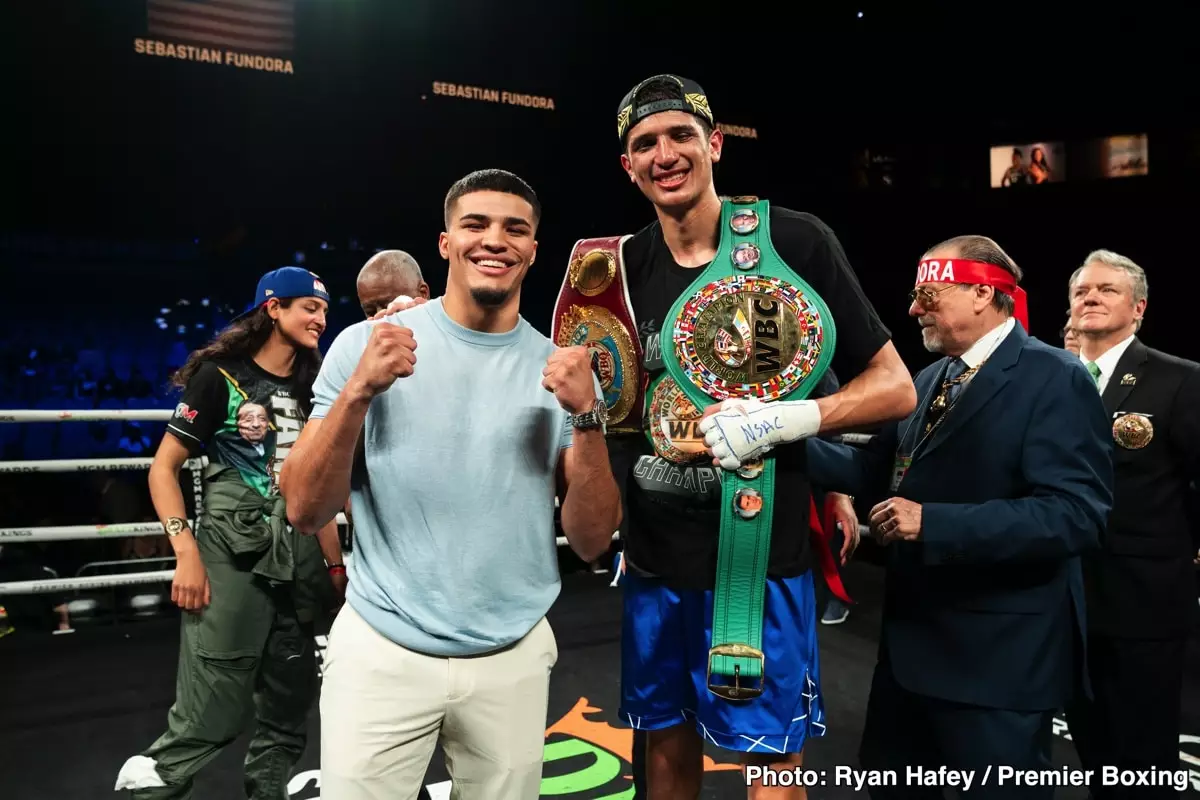Xander Zayas, a name steadily gaining recognition within the boxing community, took an audacious step in his quest for the WBO junior middleweight title when he confronted champion Sebastian Fundora following the latter’s victory over Chordale Booker. Such a bold move—entering Fundora’s dressing room after the fight—highlights Zayas’s unrelenting ambition and eagerness to escalate his career. However, ambition in boxing does not always translate into opportunity, and this encounter perfectly illustrates the intricacies of the sport, where popularity and financial viability reign supreme.
By approaching Fundora immediately post-fight in Las Vegas, Zayas essentially put himself on the map—not just as a fighter, but as a promoter of his own narrative. Despite his youthful age of 22, he carries with him the fervor of a seasoned pugilist, eager for the spotlight. However, it’s essential to recognize that this ambition could be a double-edged sword, especially in a sport governed by business interests. The immediate refusal from Fundora and his camp demonstrates that promotional dynamics overshadow mere talent and determination.
The Reality of Recognition
Zayas’s efforts to initiate dialogue with the champion reveal a broader truth in boxing: Not all fighters are created equal in the eyes of promoters and fans alike. Despite Zayas’s undeniable skill set, he remains relatively obscure outside of dedicated boxing circles and his Puerto Rican fanbase. This status as a budding contender runs contrary to Fundora’s established reputation with a growing following. In a pragmatic sense, Fundora’s team is likely hesitant to engage in what could be considered a less financially lucrative matchup. The boxing world is often dictated by the potential for profit, and Zayas, as a newcomer, may not yet offer the allure required to attract the champion’s interest.
The friction between aspiring fighters like Zayas and reigning champions encapsulates a significant challenge within the sport: balancing ambition with marketability. While Zayas is ardently pushing for his shot, Fundora’s reluctance serves as a reminder that in this highly competitive arena, fame and profitability often supersede talent alone.
The WBO’s Stance: A Mixed Blessing
The WBO’s inclination to have Fundora defend against Zayas within a 120-day window after their recent bout adds yet another layer to this narrative. On one hand, this represents a clear pathway for Zayas to secure a title shot, reinforcing his status as a mandatory challenger. Yet, it simultaneously illuminates the disheartening nature of boxing politics—where the titleholder may view his obligations as a mere hurdle to navigate rather than an opportunity for competitive engagement.
If Fundora opts to vacate or delay this obligation, the ramifications for both fighters could be significant. Zayas could be left without a clear path forward, while Fundora might pursue more lucrative matchups, leaving the WBO title scene stagnated. This scenario raises an important question: Is the current framework for mandatory challengers effectively promoting competition, or merely solidifying the status quo?
A Contender’s Path: The Need for Credibility
Zayas’s rise to his current status as WBO mandatory was notably unchallenged, having fought a relatively unknown opponent in Slawa Spomer to earn his spot. The critical backbone of competitive boxing rests firmly on the foundation of credible contenders. The WBO’s decision to sanction this matchup as an eliminator raises eyebrows, as it implies a willingness to dilute the pathway to championship titles in favor of quicker promotional wins. Future contenders need credible fights that not only elevate their standings but also establish genuine merit in the eyes of fans and promoters.
One must ponder if Top Rank, Zayas’s promoter, is undermining his potential by selectively managing his opponents, possibly out of fear that facing a higher-ranked competitor could jeopardize their investment in him. This tactical maneuvering may provide short-term security but ultimately risks stunting Zayas’s growth in the boxing world.
Looking Ahead: The Future of Boxing Negotiations
As Zayas navigates through this labyrinth of ambition and negotiation, it’s evident that he stands at a critical juncture of his boxing career. The experience of confronting Fundora, regardless of the result, adds to his narrative and builds his reputation as a fighter who seeks actively to claim his place among the elite. However, Zayas must now focus on building his marketability and asserting his presence in the sport beyond immediate ambition.
In the arena of boxing where matches are dictated by dollars and numbers, Zayas’s ongoing journey will rely on strategic decisions—not just in the ring but behind the scenes as he seeks to establish himself as a formidable contender worthy of the title he covets. With sharp focus and strategic foresight, the pathways laid out in front of him could ultimately redefine his trajectory in a sport that is as much about politics as it is about punches.


Leave a Reply